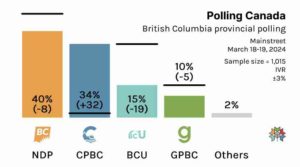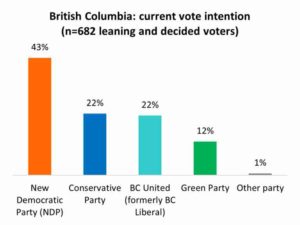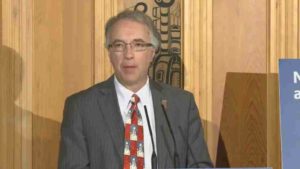
Quitto Maggi’s Mainstreet Research poll on British Columbia voter intention, above, must be considered a rogue poll, as the results vary wildly with the work of every other reputable polling firm that has been taking the temperature of British Columbia voters leading up to this autumn’s October 19th provincial election.
As published in the Vancouver Sun on March 18th ..
According to the latest Angus Reid Institute poll on voter intention, it appears Premier David Eby’s party has a sizable lead ahead of Kevin Falcon’s B.C. United and John Rustad’s B.C. Conservatives, as well as the benefit of being the incumbent party. The NDP remains the party of choice for most voters when it comes to tackling key issues in B.C., despite most respondents saying they don’t feel the provincial government has met expectations when it comes to improving on the cost of living and health care access.

Every other reputable pollster weighing in on British Columbia voter intention find themselves in accord with the polling results published by Angus Reid.

Make no mistake, B.C. Conservative Party leader John Rustad comes across as a nice guy, well-meaning, authentic, an ‘aw shucks down home fella’ you’d like to have over for Sunday dinner.
But here’s the rub for Mr. Rustad and his fledgling B.C. Conservative Party …
- Mr. Rustad’s B.C. Conservative Party has $346,000 in the bank with which to fight an election, while Kevin Falcon’s B.C. United Party — which has been peppering the airwaves with a (so far ineffective) multi-million dollar anti-David Eby, anti-B.C. NDP ad campaign, has $10 million in his pre-election war chest to fight the upcoming election — and David Eby’s BC NDP are fundraising like mad, with $12 million currently in the kitty to fight the upcoming provincial election;
- Organization. The BC NDP has a finely-tuned, can’t be beat election machine, a grassroots riding-based campaign strategy dependent on thousands of volunteers signing up to help David Eby’s government gain re-election this upcoming autumn. B.C. United are not just well-funded they, too, have an experienced campaign team. Mr. Rustad became leader of the B.C. Conservatives on March 31, 2023, less than a year ago — believe us when we write that in addition to having no money to wage a winning campaign for office, the B.C. Conservatives do not have the campaign infrastructure necessary to wage a winning campaign for office;
- 93 candidates. Each party will field 93 candidates for office this upcoming autumn. The B.C. NDP will run a tightly-controlled campaign for re-election, each of their candidates for office vetted to a fare-thee-well. The same is true for Kevin Falcon’s B.C. United Party, and Sonia Furstenau’s B.C. Green Party. Not so with John Rustad’s neophyte B.C. Conservative Party candidates for office. We’ll write more about the implications of untested candidates running for office tomorrow on VanRamblings.
As we’ve written previously, six and one-half months out from British Columbia’s autumn provincial election, approximately 4% of the British Columbia electorate are even remotely aware that there’s a provincial election on the horizon.
Let’s keep in mind that only 18% of British Columbia’s electorate tune into one or another of the various evening news programmes, read a newspaper or otherwise keep themselves informed on what’s going on in our province. There was a time when we had an informed electorate, passionate about the place where they lived.
No longer.
Now, four per cent of the electorate represents 160,000 British Columbians, no small number that. But still. One hundred sixty thousand out of four million?
Hmmm.
We’ll have a much better idea as to how British Columbians feel about the state of the province in the early part of October, three weeks or so shy of the election.
In some sense the story will be told, too, coming out of the two election debates that will occur this autumn: one broadcast on all the television networks, the other on CKNW, when they hold their pre-election Leaders’ Debate. These debates, as we’ll write tomorrow, can have a dramatic impact on the outcome of an election.
More tomorrow.